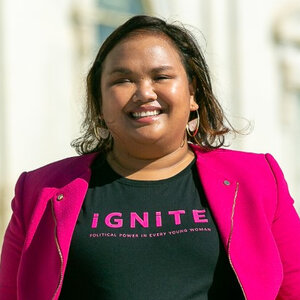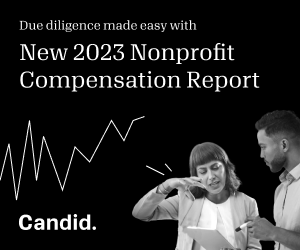Philanthropies can advance gender equality by investing in employees

The overturning of Roe v. Wade by the U.S. Supreme Court has given many donors a laser-like focus on ways to invest in gender justice, including by funding programs that expand access to reproductive health care, educate women and girls about financial literacy, or, like my own organization, IGNITE, empower and train young women to own their political power.
Investing in programmatic work like this is key. But donors are missing out on another major pathway to building gender equity, and that’s investing in the nonprofit employees who are doing the work in the field and on the ground—the vast majority of whom are women.
Women make up 73 percent of the U.S. nonprofit workforce, yet fewer than half of all nonprofits have women in senior leadership positions, let alone as CEO. The wage gap between nonprofit workers and their for-profit counterparts is, on average, $3.36 per hour, according to the Bureau of Labor Statistics. Women already face a gender wage gap, typically earning 84 percent of what men earn. According to a 2020 report, in the economy as whole, women earn 72 percent as much as men and, at the current rate, that gap will not be fully closed until 2277. The wage gap for women of color is even wider than the overall gender wage gap and closing even more slowly. Working in the nonprofit sector as a woman—especially a woman of color—often means accepting an unfair pay cut.
As a result, women working in the nonprofit sector are at higher risk of burning out. In fact, burnout is causing employees to leave nonprofits at alarming rates. According to a study by Opportunity Knocks, 30 percent of nonprofit workers are burnt out and 20 percent are at risk of burning out.
In addition to pay inequities, far too many nonprofits are unable to support robust benefits packages for their employees because of the challenging tradeoffs that arise when balancing programmatic services and staff benefits. As a result, many nonprofit workers don’t have access to paid parental or medical leave. These missing benefits impact women more because the vast majority of at-home caregivers are women. These existing inequities have become even more stark during the COVID-19 pandemic. School and childcare facility closures and an increasing need to care for ailing family members have contributed to steeper job loss for women compared with men. Although women’s labor force participation rates have risen according to the latest jobs report, the numbers are still far below pre-pandemic levels.
At IGNITE, we work to build pathways for young women into politics. For many young women, working in the nonprofit sector is part of that journey. Investing in the political futures of Gen Z women means making sure their pathways to leadership are sustainable and welcoming. If the nonprofit workforce remains this challenging for women—especially women of color and young women—we are limiting the ability of an entire generation to build their political power. To be led by the best and brightest, we need to enable the next generation of young women to work in the sector that feeds politics and leadership: nonprofits.
Our sector has been, however inadvertently, complicit in, and affected by, the inequities we’re trying so hard to end. If we want to champion change, we have to do the work internally as much as we do externally. Nonprofits depend on grants, and when grants are focused solely on programmatic work, it makes it that much harder for nonprofits to invest in workers. That’s not an excuse; it’s a reality. In practice, this looks like capacity-building funding that allows for flexibility in supporting staffing needs, as well as general operating support grants, with clarity from the funder that they welcome more investments in benefits, salaries, and staffing support.
Philanthropic funding has the power to transform the nonprofit sector and make it a place where women, and especially young women, can thrive. Imagine the possibilities if philanthropists could infuse resources to guarantee pay equity and ensure that women employees are supported, close the leadership gap and give women the resources and space to lead the organizations, and give caregivers equal opportunity in the workforce, because motherhood shouldn’t be an obstacle to professional success.
The nonprofit sector has a gender and equity problem—philanthropists need to consider holding up the workers themselves in this sector and not just focus on the vital outcomes of their labor.
Sara Guillermo is the CEO of IGNITE, America’s largest, most diverse organization devoted to young women’s political leadership.





